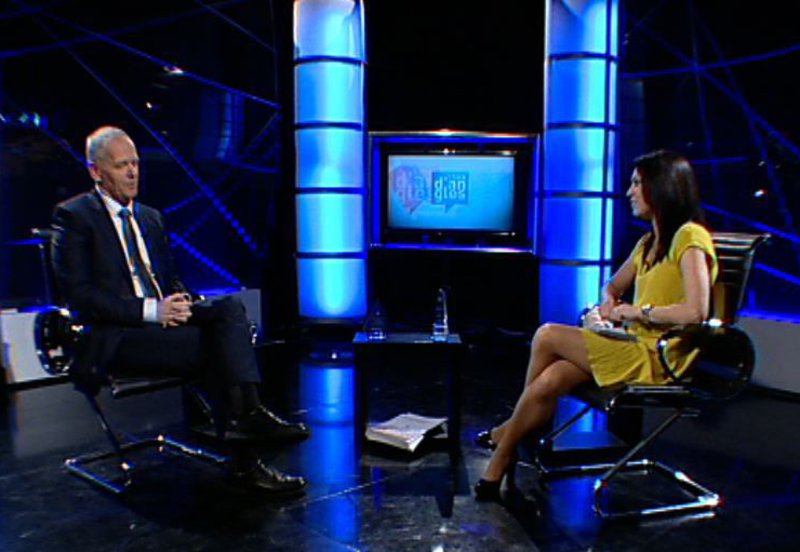Interview
From opera to English
Michael Terry Each Wednesday at 7. 10 pm, El Punt Avui TV airs the series of interviews, Catalan Connections. Marcela Topor recently talked to Michael Terry, head of Support Services at Exams Catalunya.
You've been involved in EFL for 15 years now. What is your background?
I am from Australia and I've lived in Barcelona for about 15 years. I moved here because my partner is from here and we had to decide whether to live in Catalonia or Australia. When I came here it was also a time when I was changing my career, when I really started working in English language teaching, so it all coincided.
Actually, in Australia you studied to become a professional singer.
The first 15 years of my career were as a professional singer, working in classical music, I was a sort of light lyric tenor, so I did a lot of oratorio work, some operatic singing as well, mainly in Australia, New Zealand and parts of Asia. I worked for the Australian opera and the Australian symphony orchestras. It is a very competitive career and I got to the point that I asked myself: can I cope with the pressure of this career in the years to come? For some time I was thinking how to redirect my career and I had always been interested in language, so English teaching seemed a good way to go and it coincided with moving here.
Did you find it hard to adapt to your new country?
In fact it wasn't such a culture shock, as Australian society is very multicultural as well. One of the interesting aspects, especially from a linguistic point of view, is the bilingual nature of society and discovering that Catalan culture is very strong.
Exams Catalunya represents Cambridge in Catalonia and the Balearic islands. What is the aim of the organisation?
Cambridge English language assessment is one of the largest and most important English language assessment bodies in the world. There are 2,800 exam centres throughout the world. In Catalonia, there are several exams centres and one of them is Exams Catalunya. We are a bit different to other exam centres, in the sense that here it's everything that we do. We believe very strongly in the educational value of the Cambridge exams and all our efforts are dedicated to making exam sessions a positive experience for candidates.
You recently organised a conference at the Col·legi d'Advocats in Barcelona.
We believe strongly in providing support for the preparation centres who work with us through academies, language schools, businesses and so on. We do that through a series of teacher support seminars throughout the year and also an annual English language teaching conference. This year was our third conference. We had visiting speakers from England, academics, materials writers, specialists in EFL, in the afternoon we had a series of workshops ...it was a fantastic day.
From Exams Catalunya, how do you help students to be motivated?
For a start, exams themselves are motivating. Most people when they learn something need some sort of goal. Preparing yourself, testing yourself and then there is the lovely moment when you get your results and feel happy about that. Motivation has come now to be seen as one of the key aspects of learning a language: how do you put in the effort that is required? With children, obviously, things like games are important. Teenagers have grown up with mobile phones, and technological devices of all sorts, so these should be used in the classrooms. In fact, Cambridge exams now are not done just with paper and pen but for quite a few years they've been promoting computer-based exams.
You've brought some awards here today.
Yes, Exams Catalunya is one of the 63 Platinum exam centres in the world, which is a title that is given to centres that provide a high-quality service. Every couple of years Cambridge has a Platinum awards ceremony. We've got one for customer service and one for technological developments.
English teaching has evolved a lot over the past few years. How do you see the future?
There have been many changes, but I think that the big change has been from focusing on form/grammar, to meaning//communication. It's not just about learning rules and practising grammar in a decontextualised way, but practising in a communicative way, always in context. What's going to be interesting is a couple of things: English is now spoken more by non-native speakers in the world; this is changing the language itself and the way perhaps we need to think about teaching and evaluating the language. If you've got a situation where people are more often speaking among non-natives, using English as a lingua franca, how important is it that the pronunciation is perfect? What is important is that the meaning comes across. Another aspect will involve the internet and new technologies; I think we'll see a lot of development in this area.
Leave a comment
Sign in.
Sign in if you are already a verified reader.
I want to become verified reader.
To leave comments on the website you must be a verified reader.
Note: To leave comments on the website you must be a verified reader and accept the conditions of use.

